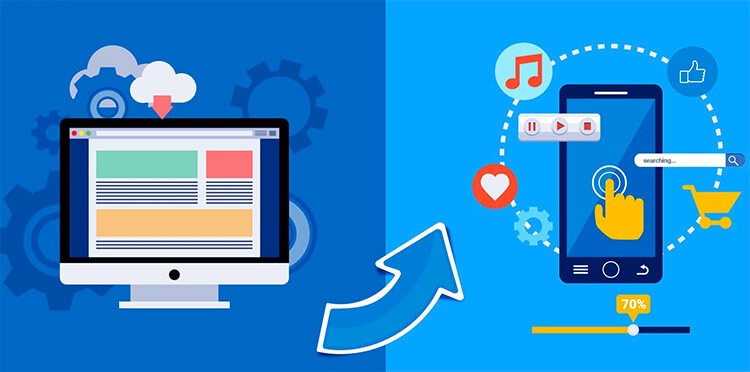Key Reason to Change Your Website into a Mobile App
People around the globe have become dependent on mobile apps for the majority of their personal activities and business tasks. These mobile apps and web apps are the driving tool behind many successful businesses today. App development companies have helped various businesses to take them to a new level. In the case of accessing online content and performing daily business activities like booking a cab, ordering food, booking tickets, doing shopping and, performing banking transactions, app development becomes the all-time favourite solution. With the right technical support, your business website can also change into an engaging mobile application that serves both Android app development and iOS app development.
Many businesses and start-ups, which have only a website, need to realise that having a business website may no longer be enough. To stay competitive and ahead of competitors, it is essential to take one step further and consider mobile app development for your business. While many businesses function with both websites and mobile applications, other companies might choose one of the two. The choice between using a website or mobile app development depends on the complexity of the business, cost, compatibility, reliability, usability, required features, functionality, and the audience they serve.
Website to Mobile App Development
Why would you transform a website into a mobile app? What are the key challenges? How can you transition from a website to mobile app development in the quickest, most affordable way possible? It can be challenging to know the dynamics of how to convert a business website into a web or mobile application. We’re going to discuss the solution to these questions and more in this blog.
In this blog article, we explain some of the key aspects when looking to change a website to a mobile app.
1) Mobile applications offer better personalisation
With mobile app development, it’s straightforward to manage users with a personalised user experience. Using A/B testing for a mobile application, you can also check various actions for your customers. These Android and iOS app development mobiles set up the user’s options and choices at the start, determining what the app users will be shown in relevant and customised content. Applications can also track user behaviour and user engagement to provide various recommendations and updates to the users.
2) Higher conversion rate
Statistical studies indicate that 77% of mobile users around the globe use the Internet with the plan or intention to purchase. Having a mobile application for your business gives you a significant advantage, because of its convenience. A mobile app can streamline the process. If you were in the hotel business and had a mobile app for delivery service, your customers would not need to go to your business website to place an order. The higher conversion rate is one of the crucial results for mobile apps.
3) Reliability across different screen sizes
The main reason to change a website to an application is its reliability on different screen sizes. The mobile applications can be run easily from different screen size smartphones, whereas a website doesn’t enhance simply in different smartphones due to various screen sizes. Many users experience difficulties using websites from smartphones as they can’t find a suitable feature or service easily. Step by step, you can provide added features, updates, and functionalities in the upgraded versions of your mobile application.
4) Freedom in designing
With all the technological advancements in web design and development, websites still depend on web browsers to achieve even the most simple and basic functions. Websites depend on many browser features like the refresh button, address bar, and back button to work.
Although mobile app development doesn’t need any of these restrictions, a mobile application is designed and developed with various complex functions based on advanced gestures like ‘swipe,’ ‘tap,’‘drag,’ ‘pinch,’ ‘hold,’ ‘close’ and many more.
5) Ability to work offline
This is the basic difference between a mobile website and a mobile application. Like websites, mobile apps require active internet connectivity to perform most tasks, but here’s the key difference: mobile applications can still provide primary content, features, and functionality to customers in offline mode.
Conclusion
Many businesses are now moving from websites to mobile and web apps. These apps help to streamline business processes and give better ROI. If you plan to change your business website to a mobile or web application, ISH Technologies is here to help you. We offer our custom software and mobile app development service in Melbourne and Sydney. Please feel free to contact us.
